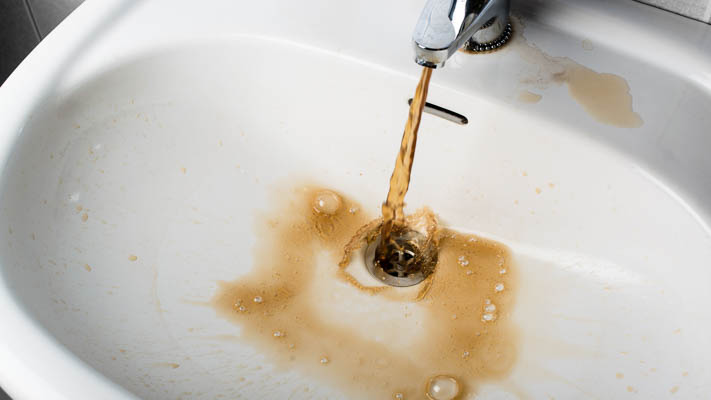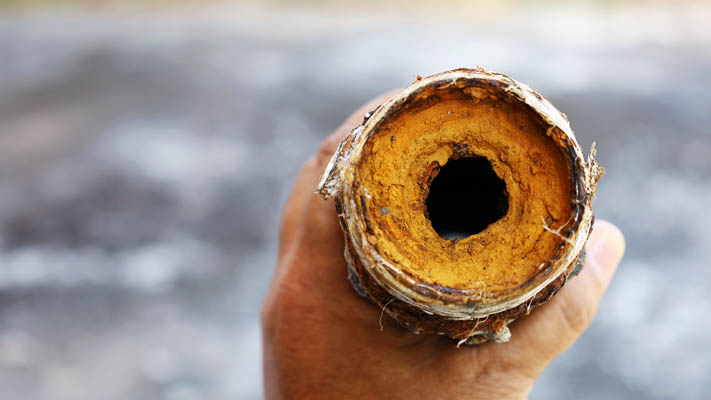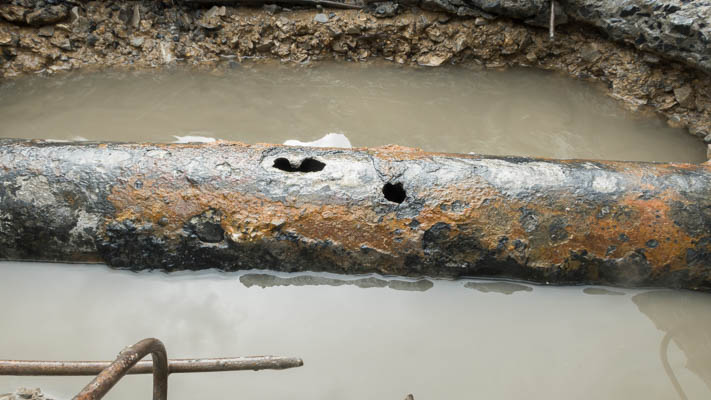What is Galvanized Plumbing?
Galvanized plumbing refers to pipes made of steel (or iron) that have been coated with a layer of zinc to prevent corrosion through a process known as galvanization.
The zinc coating acts as a barrier, protecting the underlying steel from rust while extending the lifespan of the pipes. Galvanized pipes were a popular choice for residential plumbing systems up until the 1960s.
Galvanized pipes are recognized by their grayish-silver color and have threaded connections for easy installation.
How Long Does Galvanized Plumbing Last?
In general, galvanized plumbing typically has a lifespan of around 40 to 50 years. This is often affected by water quality, maintenance, and corrosion. For more detail, we have a thorough article on the key factors that affect how long galvanized plumbing lasts.
As the zinc coating on galvanized plumbing wears away, they can start to corrode and rust. This can result in weakened pipes, leaks, and failures. Although regular maintenance and repairs can help prolong their lifespan, all galvanized pipes will eventually need to be replaced.
If your galvanized plumbing is approaching or has exceeded its expected lifespan, we always recommend considering repiping them with modern materials for a reliable and long-lasting water supply. We discuss alternative galvanized plumbing options later in this article.
What are the Signs of Galvanized Plumbing Issues?
Galvanized plumbing can develop a variety of problems over time. We have put together our top three signs that may indicate issues with your galvanized plumbing:
Rusty or discolored water: One of the most common signs of galvanized plumbing issues is the presence of rusty or discolored water. As the zinc coating wears away and the steel pipes begin to corrode, rust particles can enter the water supply, causing discoloration. If you notice brown or yellowish water coming from your faucets, it may indicate a problem with your galvanized pipes.
Low water pressure: Accumulated rust and mineral deposits within galvanized pipes can restrict the flow of water, resulting in reduced water pressure. If you experience consistently low water pressure throughout your home, it may be a sign that your galvanized pipes are deteriorating. For more information about low water pressure, check out our ultimate guide to increasing water pressure.
Frequent leaks: Galvanized pipes are prone to corrosion, which can lead to pinhole leaks or more significant pipe failures. If you notice recurring leaks in your plumbing system, especially around the joints or areas where the pipes are visibly corroded, it is a strong indication that your galvanized pipes may need to be replaced.

Get your free estimate today
With over 75,000 repipes completed, we've perfected our One-Stop Repipe™ for your home.
Why is Galvanized Plumbing Problematic?
Galvanized plumbing can present several problems as it ages. Here are some of the primary issues associated with galvanized plumbing:
- Corrosion: Over time, the zinc coating on galvanized pipes can wear away, exposing the underlying steel to water and causing it to corrode. This corrosion leads to pipe deterioration and raises the risk of leaks.
- Reduced water quality: As galvanized pipes corrode, rust and other contaminants can enter the water supply. This affects the quality and safety of your drinking water and can also lead to clogged faucets, showerheads, and other fixtures.
- Decreased water pressure: The buildup of rust and mineral deposits within galvanized pipes can restrict the flow of water, resulting in reduced water pressure throughout your home.
- Frequent leaks and pipe failures: Galvanized pipes are prone to developing leaks, especially in areas where the corrosion is most severe. These leaks can cause water damage to your property and require costly repairs.
Should I Repipe my House if it has Galvanized Plumbing?
If your home has galvanized plumbing, we strongly recommend repiping. The issues associated with galvanized pipes can lead to significant damage to your home.
Repiping your home with modern materials, such as copper piping or PEX tubing, will provide you with a reliable and efficient plumbing system for many years to come. It will eliminate the risks associated with galvanized plumbing and ensure the long-term integrity of your water supply.

Here at Repipe Specialists, we have extensive experience in repiping homes with galvanized plumbing. Our expert team will assess your specific needs, provide you with customized solutions, and deliver high-quality repiping services that meet your requirements and budget.
What are the Alternative Options to Galvanized Plumbing?
When repiping galvanized plumbing, we recommend using either copper piping or PEX tubing. Both options offer differing advantages that address the limitations of galvanized pipes.
Copper piping: Copper has long been a trusted material for plumbing systems. It is known for its durability and longevity. Copper pipes have a proven track record and can last for decades with proper installation and maintenance. We have a thorough article detailing the advantages of copper piping.
PEX tubing: PEX (cross-linked polyethylene) tubing has gained popularity in recent years due to its flexibility, ease of installation, and resistance to corrosion. PEX is a flexible plastic tubing that can be bent and routed through tight spaces, making it ideal for repiping projects. PEX tubing is known for its durability and is less prone to cracking or bursting compared to rigid materials. It is a cost-effective option for homeowners looking for a reliable repiping solution.
The choice between copper piping and PEX tubing will depend on your specific needs, budget, and preferences.
How Much Does it Cost to Repipe a House with Galvanized Plumbing?
In general, our repipes fall somewhere between $4,500 for a two-bedroom, one-bath house, and up to $15,000 for a much larger, more complicated job.
We have a detailed article about how much it costs to replace your home's plumbing.
We are experts on whole-home repipes. In fact, it's all we do. Our dedicated repipe crews work in teams, allowing us to complete the job within one to two days. This reduces labor costs and ensures a swift replacement of your plumbing system.
While repiping is an investment, it offers long-term benefits in terms of improved water quality, reduced maintenance costs, and increased home value. By eliminating the risks associated with aging galvanized plumbing, you can have the peace of mind knowing that your new plumbing system will be reliable and efficient.
Get a Quote for Repiping Your Galvanized Plumbing
Here at Repipe Specialists, we've fully replaced the plumbing in over 75,000 homes since 1991 using both copper piping and PEX tubing. We continually get positive customer feedback from customers about their overall home repipe experiences. We often exceed their expectations on:
Speed: Our repipe crews typically complete a repipe in a day, returning on another day for wall patching.
Convenience: Through our One-Stop Repipe™ process, we handle everything from permits, to wall patching, to inspections.
Cleanliness: Our crews are trained to protect your home while working (we cover all surfaces with protective sheeting), and to clean up fully at the end of each day.
Peace of Mind: Repipe Specialists is a fully licensed plumber in every state we operate in, and we back all of our repipes with a lifetime warranty.
Financing programs: To help take the sting out of unplanned repipe expenses, we offer several financing programs.
Price: As a specialist that performs hundreds of repipes a week, we can deliver high-quality repipes at a lower cost vs generalist plumbers. We have an article that covers repipe cost factors in detail.
Schedule a free in-home consult, and one of our local repipe consultants will explain all your repipe options and provide you with a written, fixed-price quote. Repipe your old galvanized plumbing today.

